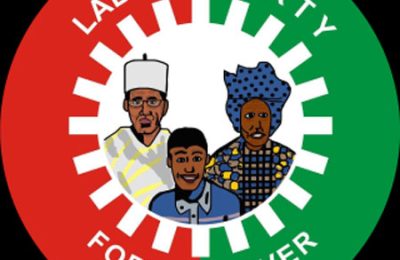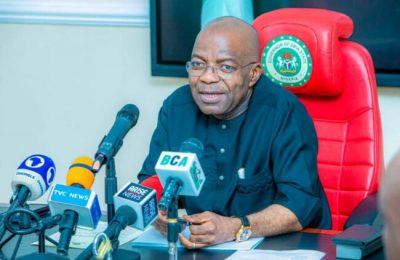Nigerian unions under the umbrella of Unions Defending Human Rights, Climate Justice, and Quality Public Services for Internally Displaced Persons (IDPs), supported by Public Services International (PSI), have called on the Federal and State governments to urgently lift the embargo on healthcare worker recruitment. The unions raised this demand at the National Advocacy/Lunch of the Participatory Research Report in Abuja, emphasising the shortage of healthcare manpower in IDP and refeguee camps.
Moradeke Abiodun Badru, PSI Project Coordinator for English-Speaking Africa, painted a grim picture of healthcare services in IDP and refugee camps. “Doctors, nurses, and other professionals are leaving Nigeria in droves for better opportunities. Governments must act now by lifting the recruitment embargo and ensuring decent work benefits for healthcare workers,” she stated. “We don’t want the donations during election campaigns; we want urgent and lasting solutions for displaced persons and their caregivers.”
The Participatory Research Report, supported by the Swedish Solidarity Support Organisation, Union-To-Union, and the Swedish Trade Union affiliate ASSR, provided evidence-based findings on the realities of public service workers in displacement settings.

It revealed systemic gaps in healthcare delivery and working conditions, urging immediate intervention by policymakers.
According to PSI Regional Secretary for Africa and Arab countries, Daniel Oberko, the report highlights the need for substantial reforms.
“The findings reveal the harsh realities faced by healthcare workers and displaced persons. Addressing these challenges requires prioritizing basic amenities, social protection, and decent working conditions,” he said.
The report identified limited implementation of social protection programmes, such as health insurance and contributory pensions, as a major challenge. It also emphasised the nexus between conflict, climate change and displacement in Nigeria, urging the government to strengthen climate resilience and adaptation mechanisms to address these drivers.

Vivian Nwachukwu, Technical Lead for Durable Solutions at the National Commission for Refugees, Migrants, and Internally Displaced Persons (NCFRMI), commended the report.
“This research provides a foundation for evidence-based interventions tailored to the needs of IDPs and healthcare workers. It’s a critical step toward durable solutions,” she stated.
Trade union leaders also added their voices to the call for urgent action.
Comrade Benjamin Anthony, National President of the Amalgamated Union of Public Corporations and Civil Service Employees (AUPCTRE), and Comrade Goodluck Ofobruku of the Medical and Health Workers Union of Nigeria (MHWUN), demanded better remuneration, personal protective equipment, and a safer working environment for workers in IDP camps.
The unions also urged the government to increase budgetary allocations to the health sector. “Given the low level of public service provision, we need more investments to scale up services to universal standards,” Badru added. She stressed the importance of enhanced welfare packages, better pay, and job security for frontline workers in displacement settings.
The report further recommended innovative social dialogue mechanisms to address occupational hazards, mental health risks, and security concerns faced by healthcare workers. “Social dialogue must now focus on risks and security of frontline workers, who are often exposed to emergencies and displacement,” Oberko stated.
Another key recommendation was for unions to develop training modules to enhance their understanding of the intersectionality between conflict, climate change, and public health emergencies. “We must empower unions to better advocate for their members and the communities they serve,” said Badru.
The unions called for greater collaboration with interventionist agencies such as NCFRMI and the North-East Development Commission (NEDC). These partnerships, they believe, are essential for addressing the multifaceted challenges of displacement and improving service delivery in IDP camps.
Legislative engagement was another critical area highlighted. The unions advocated for amendments to Nigeria’s Climate Act and the domestication of the African Union Convention for the Protection of Internally Displaced Persons. They also called for sustained advocacy for an emergency response fund to address displacement challenges effectively.
With increased advocacy, legislative engagement, and budgetary commitments, the unions expressed hope that Nigeria can address the root causes of displacement and ensure better working conditions for healthcare providers. “This is not just about saving lives but also about saving the dignity of workers on the frontlines,” Badru concluded.
ITUC-Africa leads high-level advocacy visit to push for workers’ rights inclusion in AFCFTA
African trade unions, under the leadership of the African Regional Organisation of the International Trade Union Confederation (ITUC-Africa), have pronounced an action to embark on a high-stakes advocacy mission to the African Continental Free Trade Area (AfCFTA) Secretariat in Accra, on 19th November, 2024.
The mission’s focus is push for a dedicated labour chapter within the AfCFTA protocols, a step that ITUC-Africa says is critical to safeguarding workers’ rights and ensuring fair labour standards across the continent.
“It is time for workers’ voices to be a part of the AfCFTA framework,” declared ITUC-Africa’s General Secretary, Akhator Joel Odigie. “Without a labour chapter, we risk creating a trade zone that overlooks the needs and rights of Africa’s workforce.”
According to Odigie, the current structure of the AfCFTA protocols lacks a formal platform for labour issues, leaving millions of African workers vulnerable to potential exploitation. “The AfCFTA must include protections that make Africa’s trade and investment policies beneficial to all,” he argued. “This is about more than just trade; it’s about establishing a framework that recognises and respects the contributions of African workers.”
ITUC-Africa’s push, backed by partners like the Labour Research Service (LRS) and Finland’s SASK project, is gaining momentum as trade unions across the continent unite under a shared banner for workers’ rights.
The advocacy visit will facilitate direct dialogue with the AfCFTA Secretariat, allowing union leaders to voice their concerns and negotiate specific provisions for workers within the trade agreement. Among the key issues on the table are structured engagement spaces for trade unions, decent job creation, fair wages, and robust occupational health and safety measures. “We need to build spaces where workers’ needs are systematically addressed within the AfCFTA,” Odigie emphasised. “This is a crucial step toward a trade environment that genuinely benefits African citizens.”
In addition to engaging with the AfCFTA Secretariat, ITUC-Africa has outlined a strategic review of past advocacy efforts, aimed at aligning and strengthening ongoing initiatives across the continent. The union representatives will examine the outcomes of previous engagements to develop a roadmap for more effective and sustainable trade union participation in AfCFTA processes. “This is about refining our strategies and making sure our voice is not only heard but has lasting impact,” Odigie explained. “We are here to build a collaborative and proactive approach to workers’ rights in Africa.”
Public outreach is also a key part of the mission, as trade unions intend to ramp up media engagement to raise awareness around the importance of a labour-inclusive AfCFTA. The union leaders argue that an informed public is essential to achieving their goals. “African citizens must know what is at stake in the AfCFTA negotiations,” said an ITUC-Africa spokesperson. “Our media engagement is about mobilising public support for policies that protect and uplift workers.”
ITUC-Africa and its partners are also advocating for the inclusion of trade unions in each country’s National Implementation Committee (NIC) to ensure that workers’ voices are present at every level of AfCFTA’s rollout. They are also championing continuous learning and skills development initiatives to help African workers adapt to technological advancements linked to the Fourth Industrial Revolution. “We need policies that prepare workers for the future,” Odigie said, noting the potential for significant economic shifts as a result of technological change.
Looking ahead, ITUC-Africa sees this advocacy visit as the first of many steps toward meaningful engagement with the AfCFTA. “This is only the beginning,” Odigie affirmed. “We are committed to building strong relationships with the AfCFTA Secretariat, national governments, and other stakeholders to make sure that Africa’s trade policies reflect the interests and welfare of its workers.” As trade union leaders converge in Accra, there is a clear message: African workers deserve a seat at the table, and ITUC-Africa is here to ensure they get it.
READ ALSO: Refugees Day: PSI calls for action to protect rights of IDPs, refugees in Nigeria







